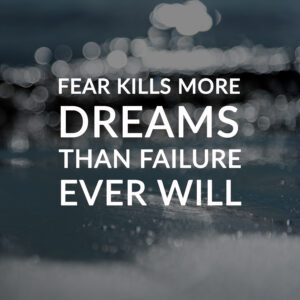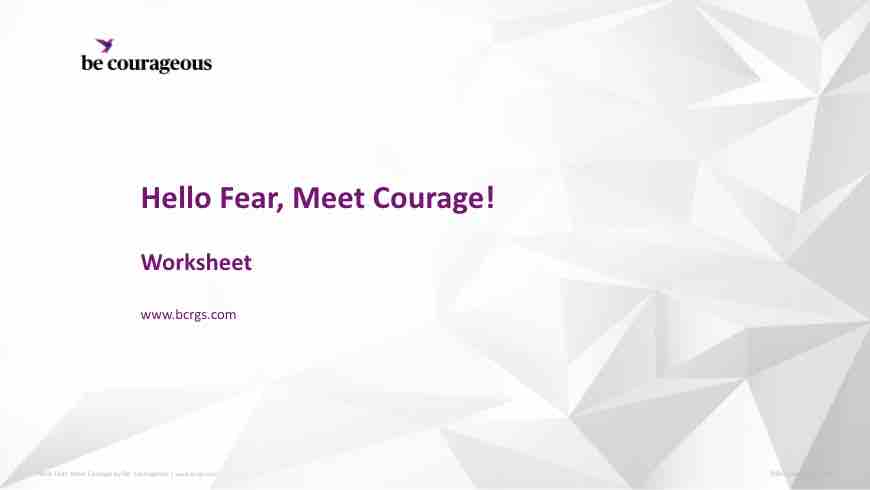Courage is not a lack of fear but the ability to navigate through it.
Do you make decisions from a place of fear (trying to avoid a certain outcome or situation) or a place of courage (trying to move toward an envisioned ideal outcome?)
The results you see in your personal and work life stem from your behavior, which is deeply influenced by your mental state.
Think about it. If you’re in a state of fear and worry, your actions and outcomes reflect that. Fear can lead to mediocre outcomes, playing it safe, and dimming our light.
Shifting to a state of courage and confidence leads to behaviors like honest communication, living purposefully, and embracing your passions.
Fear-based work environments
Fear thrives in environments marked by aggression and distrust.
Think of some of the workplaces you may have experienced in your career where the culture was more punishing than supportive. Maybe the leadership team used tactics that might be seen in a military boot camp or by an old-school, intense high school football team coach.
While scare-tactics can be motivating (I better not screw up, or I’ll be fired!), when you witness your colleague getting raked across the coals for sharing, you probably wouldn’t be the first one raising your hand with a bold new idea. Humans tend to bottle up and play it safe in those conditions.
As you can imagine, growth, breakthroughs, and collaboration do not thrive in those conditions.
Fear is always there— for all of us. Even for me, as the head of an entire organization based on the principles of courage and someone who has dedicated his life to its learning and practice. I’m probably one of the most worried guys you’ll meet, especially when it comes to my teenage daughters! The more you try to live a courageous life, the more fears you will have to face.
Courage is about developing a relationship with fear and gaining the ability to know when it’s appropriate to push through it, or listen to it.
Different kinds of fear
We can differentiate between fear that warrants caution – like fear for physical safety – and fear that stems from emotional uncertainty or discomfort. Often, it arises when we face the unknown, feeling out of control. But, embracing this fear as a learning opportunity can lead to significant growth.
Consider a triathlon athlete. They might be scared of the unknown challenges of a long-distance race. But by acknowledging this fear and choosing to move forward regardless, they transform the experience into a powerful journey of self-discovery and growth. As my co-founder and partner-in-all-things, Jenna told her legs during her triathlon distance training when her legs were wanting to give out on her, “Shut up, legs! We’ve got this!” And she did!
Steps to facing fear with courage
- Think of a situation you’re in, a desire you have right now that you fear, perhaps something you’re stalling on doing, or a dream that feels out of reach.
- Clarify: Are you feeling fear or excitement? In the brain, they’re the same!
- Examine your fear. What is its root? This process involves recognizing your ‘old voice’ – the voice of past experiences and external influences – and tuning into your ‘new voice’ or your intuition.
- Isolate and name your fear. In our sessions with the world’s top business leaders, we’ve identified six core fears that often hinder progress:
- Loss & Ruin: Fear of losing (your job, relationship, money, reputation, or the decisions you’re making would lead to your ruin).
- Process: Fear of the difficult process to get to the goal (like the arduous task of starting a business).
- Rejection: Fear of rejection (like proposing a new direction for your business that may contradict the company’s current path).
- Regret: Fear of doing or not doing something (like having a hard conversation or taking action on a risky future endeavor).
- Responsibility: Fear that if you succeed, you’ll be responsible for even more (like kids, reputation, growth, employees).
- Failure: Fear you aren’t good enough to succeed at something (like being in a committed relationship, being a good manager, prototypes failing).
- Ask yourself if your worry is true. Inspired by the brilliant work of Byron Katie, inquiry is an important way to let go of what holds our thoughts and behaviors in a fearful state. Most of the time, what you’re afraid of will not come to pass, and “What If” has an irrational hold on you. People often design their lives trying to avoid the fear of the unknown. By naming your fear and understanding where it comes from, you can diminish its power.
- Remind yourself that sometimes fears are irrational, and you are safe. There’s (probably) no tiger behind the tree about to attack you, triggering your fight, flight, or freeze response. Many people fear the ocean because of sharks, even if there hasn’t ever been a shark sighting on that beach. And even if you have been in a similar situation that felt dangerous before, remember that the context, people, or situation may be different now.
- Anchor yourself on your belief and desire for something greater than your fear. You have to want the outcome more than the fear. As a triathlete, you may want the sense of accomplishment, the strength of your body, the medal, and the opportunity to share the experience with your partner to push your limits, and those motivators will transcend the fear you have to take your shot.
For example, recently, Jenna was working with a client on a difficult conversation she wanted to have with her spouse. Her client was petrified of the possible disruption it could have in her life if the conversation did not go well (or even if it did.) Life would not go on the same after this conversation, and she knew it.
So they worked together to identify the fear, and she was reminded that her need for a more fulfilling partnership and an authentic life with a bright future outweighed her worry.
Her client gathered the strength to listen to her true inner voice and had the conversation, and she was glad she did because it moved her relationship to a new level.
The 40% Rule
I follow the advice of Navy SEAL and author of “Can’t Hurt Me,” David Goggins, who uses the “40% Rule.”
At the point in your life that things get so hard you want to talk yourself out of it, run away, or quit, realize that at that point, you’re only utilizing about 40% of your capability. I tell myself, “Let’s see how much further I could go when I’m not allowing myself to be brought down by the voice of fear (which is often not even my voice but the voices of others).
There’s always fear, and there’s always courage

Ultimately, fear never truly disappears. It’s about how much energy we give it. By practicing courage daily, we learn to manage our fears more effectively, reducing their impact on our lives.
And as we do, we discover that the other side of worry is often filled with accomplishments, resilience, and a sense of fulfillment.
Are you more uncomfortable staying where you are or doing something hard to get to a new level? Our research shows that the majority of people, over time are more uncomfortable being stagnant versus facing their fear. The longer you are immobile and allow your fear to dominate you, the harder it is to make forward progress.
The more you practice going through your fear and doing it anyway, you will become less of a fearful person and more courageous. You’ll realize you’ll be okay on the other side, no matter what because you believe in yourself and the larger purpose of what you’re trying to do.
So, the next time fear whispers in your ear, acknowledge it, then tell it to step aside. Because your journey, fueled by courage, is waiting.
Co-writers: Jenna Hermans and Shannon Geher


